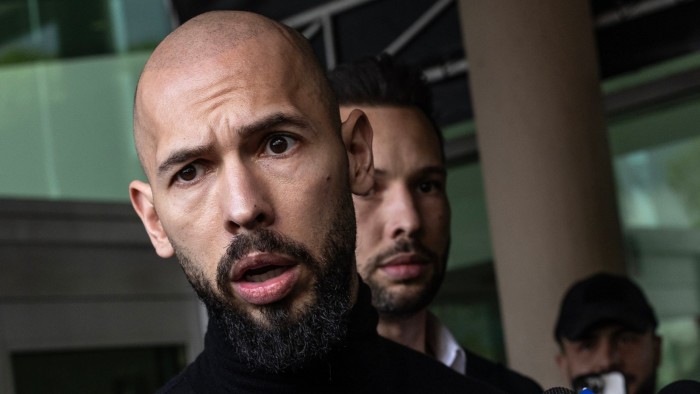Unlock the Editor’s Digest for free
Roula Khalaf, Editor of the FT, selects her favourite stories in this weekly newsletter.
A case against rightwing influencer Andrew Tate over claims of physical and sexual abuse is set to feature arguments about “coercive control” for the first time, the High Court in London has heard.
Four women are suing Tate over claims they were subjected to sexual violence. Two of them say they worked for him as part of his webcam business and the other two say he “purported to embark upon an intimate relationship” with them.
Tate has vigorously denied the claims, variously describing the allegations against him in the civil action as a “pack of lies” and “not credible”.
A central part of the claim is the concept of coercive control. Anne Studd KC, representing the women, said in written submissions for a preliminary hearing on Tuesday that it was a “relatively recently identified form of violence”.
“It is a form of grooming and manipulation where the victim becomes less and less able to respond in what might be perceived as a normal way,” Studd said.
The barrister said the case was “understood to be the first claim where allegations of coercive control have been considered in a civil context of whether that behaviour can amount to intentional infliction of harm”.
Tate’s lawyers said in a defence filed with the court that all sexual activity was consensual. They also argue that the claims, which cover alleged activities as far back as 2013, are statute-barred because they have been brought too late.
Lawyers for both sides clashed at the hearing over expert evidence that could be heard as part of the trial.
The claimants wanted to call several academics, including Jane Monckton-Smith, professor of public protection at the University of Gloucestershire, and Professor Timothy Dalgleish, a clinical psychologist at the University of Cambridge.
Studd said this expert evidence would “assist the court in understanding the nature and effect of coercive control”. Dalgleish’s testimony, she said, would help the court understand “why victims of sexual violence do not always bring claims precipitously”.
But Vanessa Marshall KC, for Tate, said this type of evidence was not necessary. The trial would be heard by an “entirely competent” High Court judge with ample experience. There were also “real concerns” about comments Monckton-Smith had already made about the defendant, she said.
Judge Richard Armstrong said he was not persuaded that Monckton-Smith’s evidence was necessary. The judge who hears the trial would be “well positioned to deal with issues of coercive and controlling behaviour”, he said.
However, the judge did allow the claimants to call Dalgleish, saying his evidence could help address the question about whether the claims have been brought too late.
A trial is set to take place early in 2027 over 16 days.
Tate and his brother Tristan Tate have also been under investigation in Romania over allegations including human trafficking and money laundering. They have denied wrongdoing.




